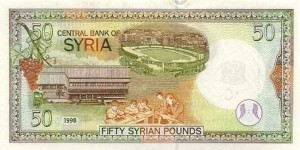 Continuing protests are intensifying pressure on the Syrian economy, as new figures show nearly 10 per cent of deposits in the country’s banking system were withdrawn during the first four months of 2011.
Continuing protests are intensifying pressure on the Syrian economy, as new figures show nearly 10 per cent of deposits in the country’s banking system were withdrawn during the first four months of 2011.
The equivalent of $2.6bn was withdrawn between January and April this year, according to figures released by the Syrian Central Bank earlier this week.
Bankers in Lebanon say rumours of capital flight out of Syria in to the Lebanese banking system are exaggerated, although some admit recent patterns in deposit growth in Lebanon could suggest some relationship with the situation in Syria.
Deposits in Lebanon surged in March and April, after unrest in Syria got under way, but the rate of growth slowed down in May after the Assad regime introduced capital and conversion controls to protect the Syrian pound.
Although measures such as reducing the amount of foreign currency commercial banks could sell to local residents succeeded in decreasing pressure on the pound in the short term, the continuing instability means that many are now thought to be seeking other ways to protect their assets.
“(The pound) is still under pressure because of the fact that the outlook is uncertain,” says Marwan Barakat, head of research at Banque Audi, one of Lebanon’s largest banks.
Syrians admit there are increasing concerns about the value of their savings.
“Many people are trying to turn their Syrian pounds into another currency,” says one middle class Damascus resident.
“But they know that’s bad for the currency, so instead they are trying to put it into other things like cars or flats. The smart ones are taking loans from the government. Then if something happens, they won’t have to pay it back.”
He adds that current restrictions are making it difficult to buy dollars from government banks: “You can only get them if you are travelling and you have your plane tickets with you. There are also a lot of other conditions.”
The black market is the only viable option for many, although this is becoming increasingly expensive and difficult, he says.
Black market rates in Damascus are now persistently above SP52 to the dollar, compared with an official rate of SP47.5 to the dollar.
In a sign of its concern over the value of the currency, the government recently moved to crack down on illegal money changers. Central bank governor Adib Mayyaleh this week announced that 30 illegal money changers had been shut down in the capital alone since March. Local tradesmen say the owners have been detained.
The economy is seen as the Achilles heel of the Assad regime, and the opposition abroad are lobbying the US and EU to add to the pressure by depriving it of sources of revenue.
Although the government started off the crisis with approximately $17bn in foreign reserves, which Mr Barakat estimates would have covered about 67 per cent of Syrian pound deposits, analysts estimate they are being depleted at a rate of about $70m a week as the regime tries to stabilise the pound.
According to Christopher Phillips, Syria analyst at the Economist Intelligence Unit, Syria’s economic strategy appears to have been based on dealing with the crisis quickly and decisively.
“Clearly someone at the top level miscalculated how long this was going to take,” said Mr Phillips.
Another indicator of how concerned the regime is about the state of its finances is that Walid Moallem, Syria’s foreign minister, asked Iraq to provide them with cheap oil during a visit to Baghdad in May. According to Iraqi officials, Mr Moallem requested that Syria be supplied with Iraqi crude at the same discounted rate as Jordan, although no decision has been taken yet on whether to grant the request.
According to a diplomat in Damascus, however, even guaranteed cheap oil from Iraq will not be enough to prevent an eventual economic crisis if protests continue. “It would just be delaying the inevitable,” said the diplomat.

Leave a Reply
You must be logged in to post a comment.